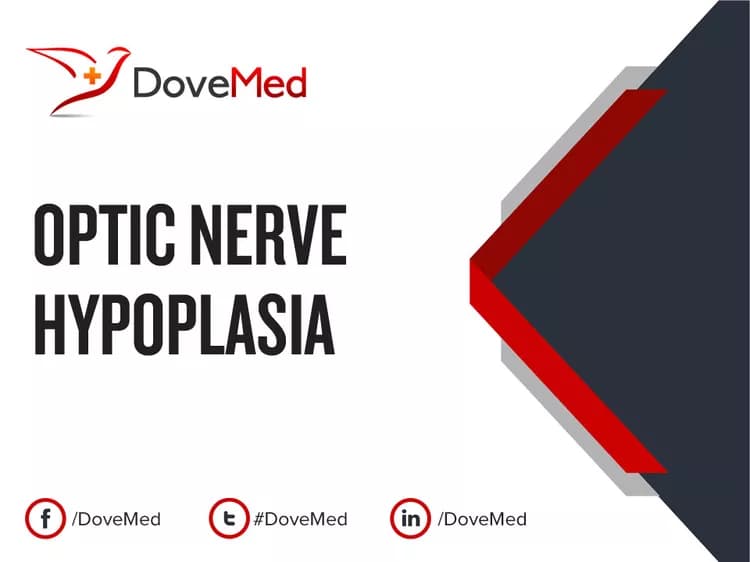What are the other Names for this Condition? (Also known as/Synonyms)
- DeMorsier Syndrome
- ONH (Optic Nerve Hypoplasia)
- Septo-Optic Dysplasia (SOD)
What is Optic Nerve Hypoplasia? (Definition/Background Information)
- Optic Nerve Hypoplasia (ONH) is a medical condition where the optic nerve, the nerve that carries messages from the eyes to the brain, is underdeveloped before or during birth
- It is one of the most common causes of visual impairment in children less than 3 years old. Individuals with Optic Nerve Hypoplasia may also have hypopituitarism (decreased secretion of the hormones in the pituitary gland) and malformations in the midline of the brain
- ONH is neither progressive nor is it reported to be hereditary (running in families). A mutation in the gene HESX1 is associated with the condition. Maternal diabetes, alcoholism and drug abuse during pregnancy are considered risk factors for ONH. However, the exact cause of Optic Nerve Hypoplasia is unknown
- The signs and symptoms of Optic Nerve Hypoplasia may vary from mild to severe. Children with this condition may have unaffected vision, partially affected vision, or it may be completely lost. Other symptoms include involuntary eye movements, light sensitivity, impulsivity, and learning disabilities
- If Optic Nerve Hypoplasia is suspected, then the healthcare provider may request MRI or CT scan of the midline brain. Hormonal assessments by an endocrinologist may be needed, if the pituitary gland is affected
- There are currently no treatment measures available to successfully treat Optic Nerve Hypoplasia. However, in many cases, the use of corrective glasses is beneficial
- Presently, there are no preventive measures available, since the cause of Optic Nerve Hypoplasia is unclear. However, it is not a progressive disorder and many patients respond well to the use of suitable corrective glasses
Who gets Optic Nerve Hypoplasia? (Age and Sex Distribution)
- Optic Nerve Hypoplasia occurs before or during birth; but, it does not progress later in life
- Both males and females may be affected
- There is no racial or ethnic predilection in the development of Optic Nerve Hypoplasia
- No geographical preference has also been noted
What are the Risk Factors for Optic Nerve Hypoplasia? (Predisposing Factors)
At least one genetic mutation in the HESX1 gene has been reported to be associated with Optic Nerve Hypoplasia. ONH has also been associated with babies born to mothers that were affected with the following conditions:
- Gestational diabetes (diabetes during pregnancy)
- Alcohol and drug abuse
- Use of anti-epileptic drugs
- Young maternal age (20 years and below)
It is important to note that having a risk factor does not mean that one will get the condition. A risk factor increases one's chances of getting a condition compared to an individual without the risk factors. Some risk factors are more important than others.
Also, not having a risk factor does not mean that an individual will not get the condition. It is always important to discuss the effect of risk factors with your healthcare provider.
What are the Causes of Optic Nerve Hypoplasia? (Etiology)
The exact cause of Optic Nerve Hypoplasia development is currently unknown.
- An involvement of the HESX1 gene is reported in the affected individuals, although no hereditary factors are noted
- The health status of the expectant mother has been linked to the condition in some cases
What are the Signs and Symptoms of Optic Nerve Hypoplasia?
Most children with Optic Nerve Hypoplasia are reported to have one or more of the following signs and symptoms:
- Nystagmus or involuntary eye movement
- Photophobia or light sensitivity
- Learning disabilities
- Lack of depth perception
- Impulsivity - displaying behavior with little or no forethought
How is Optic Nerve Hypoplasia Diagnosed?
The diagnosis of Optic Nerve Hypoplasia may involve the following tests and exams:
- A complete physical examination and medical history evaluation (including health condition of the mother during pregnancy)
- Many of the midline brain abnormalities and pituitary gland sizes can be identified using a magnetic resonance imagining (MRI) or computer tomography (CT) scan
- A hormonal examination by an endocrinologist may be required in order to check the levels of hormones secreted by the pituitary gland
- Eye tests to assess the extent of vision damage
Many clinical conditions may have similar signs and symptoms. Your healthcare provider may perform additional tests to rule out other clinical conditions to arrive at a definitive diagnosis.
What are the possible Complications of Optic Nerve Hypoplasia?
Individuals with Optic Nerve Hypoplasia (ONH) might lose vision partially or completely, in either one or both the eyes (i.e., it is a unilateral or bilateral condition). Additionally, if hypopituitarism is involved with ONH, there could be secondary complications including:
- Physical growth interruptions
- Hypoglycemia or low blood sugar
- Jaundice or yellow skin coloration
- Micropenis in males
How is Optic Nerve Hypoplasia Treated?
Presently, Optic Nerve Hypoplasia (ONH) is a condition that has no cure. The symptoms may be managed and the vision quality improved to the extent possible.
- Since ONH is not a progressive condition, corrective glasses may be beneficial for individuals with vision defects
- Stem cell treatment has not been found to be very effective in treating individuals with ONH
How can Optic Nerve Hypoplasia be Prevented?
Currently, no known preventive measures have been reported for Optic Nerve Hypoplasia (ONH). However, promptly treating conditions, such as gestational diabetes, and completely avoiding alcohol and illegal drugs during pregnancy may help lower the risk for ONH in children.
What is the Prognosis of Optic Nerve Hypoplasia (Outcomes/Resolutions)
- In Optic Nerve Hypoplasia (ONH), visual acuity varies from one individual to another. Also, most individuals have near-normal vision
- For those with one or both eyes that are legally blind, assistance may be offered through corrective glasses
- There are no life-threatening features associated with Optic Nerve Hypoplasia unless pituitary dysfunction is noted. If pituitary dysfunction occurs, other disabilities or even brain disabilities may accompany poor vision
Additional and Relevant Useful Information for Optic Nerve Hypoplasia:
Please visit our Eye & Vision Health Center for more physician-approved health information:
Related Articles
Test Your Knowledge
Asked by users
Related Centers
Related Specialties
Related Physicians
Related Procedures
Related Resources
Join DoveHubs
and connect with fellow professionals



0 Comments
Please log in to post a comment.